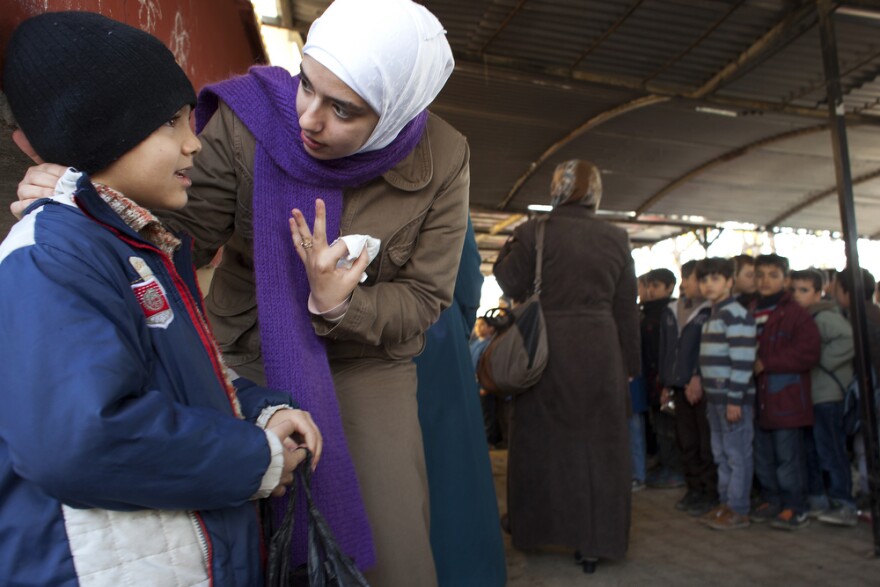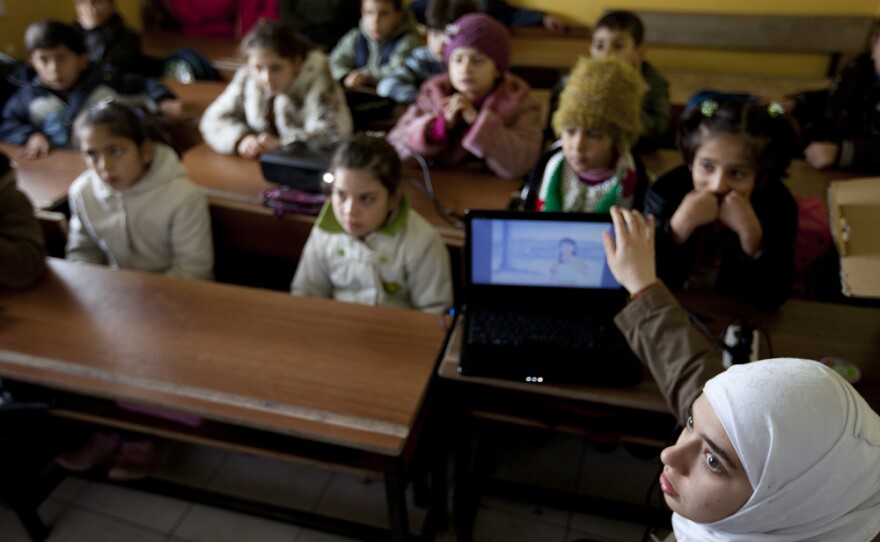The war in Syria is taking a huge toll on the children. An international team of researchers that interviewed Syrian kids in a refugee camp in Turkey found that 3 out of 4 have lost a loved one. Almost half have post-traumatic stress disorder and elevated levels of depression.
There are efforts to help, but it's challenging. In the southern Turkish city of Gaziantep, the bell rings at 8 a.m. at the Friendship Elementary School. Syrian kids, in fresh school uniforms, cram into desks, with more than 40 students in every classroom.
The Turkish government provided the new building, with a garden and brightly painted walls. Syrian parents and volunteer teachers run the school, free of charge for the students, who number 270 and are increasing by the day.
The volunteer teachers offer the Syrian curriculum from textbooks collected from schools that have closed back home.
"Arabic, English, Turkish, art, everything," says Manal Khamis, who teaches English.

Working With Traumatized Children
The school offers a few hours of normalcy for the children, but the war in Syria has already warped their lives.
Khamis recalls a boy who enrolled within days of fleeing the northern city of Aleppo after a bomb exploded in front of his house.
"He can't speak any word for three days," she says.
And so the teachers encouraged the silent boy to draw.
"He draws only windows –- closed windows –- and then he opened the window. Why? We don't know. We asked him, 'What do you mean by the open window?' He can't speak," Khamis says.
All the kids were sad when they were forced to leave home, says Khamis, who does her best to cheer her students.
These teachers were forced out, too. They are part of the professional class in Aleppo, Syria's largest city and its business capital.
They bring specialized skills to this overcrowded school in Turkey. Manar Munal Hasan, a medical doctor, is now the school psychologist. She says she sees signs of trauma.
"They oftentimes get into fights and often I call their parents to come and to solve what has happened, and even the parents are surprised," Hasan says. The parents tell her: "Our children did not behave like this, they did not behave like that."

Feeling Insecure
Though the children are now in a safe area in southern Turkey, many say they don't feel secure and worry about relatives still in Syria.
"All of my relatives, and my grandparents, are in Syria and I don't have anyone to play with," says Yaman, age 7, who comes from Aleppo. "They might die. Many things can happen."
A new study warns that Syrian children are the hidden casualty of the war.
Researchers from Turkish and American universities, as well as Norway's Institute of Public Health, interviewed more than 300 children in a refugee camp on the Turkish border.
Preliminary findings were released at a news conference in Washington. Dr. Selcuk Sirin, a psychology professor at New York University, says they are disturbing.
"We are talking about a very traumatized group," Sirin says. "If we do not do our job as an international community of adults, these kids will go untreated with high levels of depression, high levels of PTSD. This will come back and haunt us in the future."
The warning about a haunting future can be heard clearly in an old apartment building in Antakya, Turkey, which also serves as a school for Syrian refugees.
Rahaf Tinowi, who is only 20, works as the school councilor. She says the children have been damaged by the war.
They often dream about killing Syria's president, Bashar Assad, she says.
"Not all the families, but a lot of them, are always teaching the children, 'We have to kill them, to kill, kill, kill, all the family of Bashar,' " she says. "So that's our job. We have to change these views."
And it is a very hard job to change those views, she says quietly, after all that these children have witnessed.
NPR's Michele Kelemen contributed to this report from Washington.
Copyright 2021 NPR. To see more, visit https://www.npr.org.














